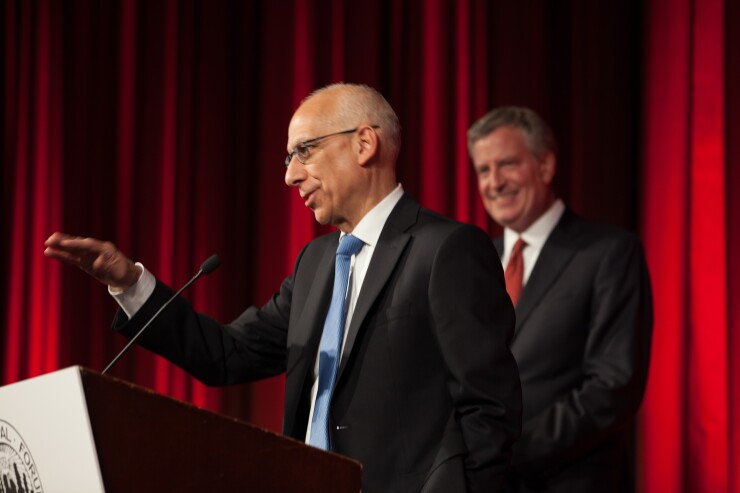New York City officials intend to fight language in Gov. Andrew Cuomo’s budget that they say would put the city on the hook for emergency repairs by the state-run Metropolitan Transportation Authority.
The provisions would impose a “new capital liability” for transit, and break a longstanding history on funding the MTA, First Deputy Mayor Dean Fuleihan said Tuesday during a conference call with reporters.
Fuleihan said the city received no advance notice. He also called a value-capture proposal that would divert property taxes from the city for the MTA illegal.

“This has significant ramifications in the negative for the city of New York,” he said during the call, which included city Corporation Counsel Zachary Carter and city Transportation Commissioner Polly Trottenberg, who sits on the MTA board.
City officials have also maintained the MTA spends excessively on suburban-oriented projects.
MTA Chairman Joseph Lhota, in a separate call later Tuesday, said $18.4 billion of the MTA's current five-year capital plan is directed to city transit.
Cuomo delivered his $168 billion
The proposed state budget earmarks $4.8 billion in operating money for the MTA, up $334 million from last year. This, said Lhota, marks the eighth straight year-over-year increase in state funding for the authority.
MTA President Patrick Foye defended the use of value-capture tax revenues for mass transit. "We've found that it's an effective way to fund transit in the city and around the country and the world," he said, citing borrowing by the Hudson Yards Development Corp. to backstop the expansion of the No. 7 subway line west of Times Square.
He said the value-capture bill calls for approval of all capital projects by a capital review board, on which the city has representation.
Last June, Cuomo declared a state of emergency at the MTA, one of the largest municipal issuers with $36.7 billion of debt as of Dec 31. The MTA, which Cuomo controls, operates the city’s subways and buses, Long Island and Metro-North commuter railroads, and several intraborough bridges and tunnels.
Mayor Bill de Blasio, a Cuomo adversary, favors a millionaire’s tax, which he said would help fund transit and provide 50% discounts for lower-income riders. The mayor also said New York State should divert roughly $456 million it redirected from the MTA’s coffers back into transit.
Both de Blasio and Lhota intend to testify at budget hearings in Albany.
A bloc of de Blasio appointees on the MTA board on Monday voted against a $1 billion Cuomo-backed station improvement projects, calling them misaligned with city commuters. The full MTA board is scheduled to meet Wednesday.

“A lot of these stations are not the highest priority,” said Trottenberg. “They are facelifts, which are nice to have but not what we need to have.”
According to Carter, state legislation enacted in 1953 caps the city’s contribution to mass transit at $5 million.
“In the 65 years that have passed, any contribution the city has made has been voluntary or subject to political negotiation. There is no legal obligation on the part of the city to contribute more.”
According to Fuleihan, the city already contributes $1.6 billion in operating funds and $2.5 billion in capital funds to the MTA.
“That is not a minor part of our budget,” said Fuleihan. “What we have constantly said is that the MTA has to do things much better. It has to improve its operations.”
Cuomo is also weighing a congestion pricing proposal his 15-member
Car drivers would pay a surcharge of up to $11.52, truckers $25.34. Taxis and passengers of app-based ride services such as Uber and Lyft would pay a surcharge of $2 to $5 to enter the core part of Manhattan.





